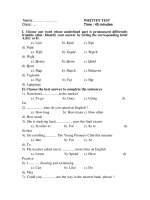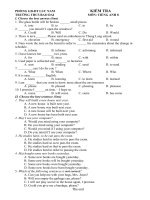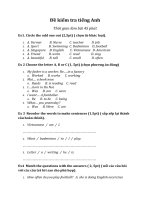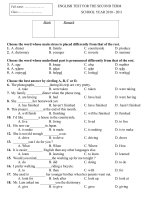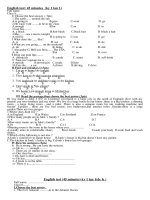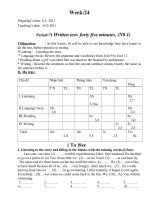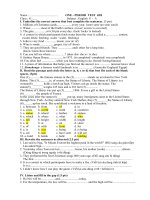Đề kiểm tra Tiếng Anh lớp 8 đề 15
Bạn đang xem bản rút gọn của tài liệu. Xem và tải ngay bản đầy đủ của tài liệu tại đây (71.76 KB, 5 trang )
Name:………………… Written test
Class: … Time : 45 minutes
I. Choose one word whose underlined part is pronounced differently
fromthe other. Identify your answer by cirling the corresponding letter
A,B,C or D.
a). Live b). Kind c). Kid
d). Print
a). Wall b). Grade c). Watch
d). Walk
a). House b). Horse c). Hotel
d). Hour
a). Map b). Match c). Behavior
d). Transmit
a). Flat b). Far c). Hat
d). Language
II. Choose the best answer to complete the sentences
1). Nam hates...................to the market
a). To go b). Goes c). Going d).
Go
2). .................. time do you spend on English ?
a). How long b). How many c). How often
d). How much
3). She is studying hard................... pass the final exams
a). In order to b). For c). So to d).
So that
4). I'm enrolling............. The Young Pioneers Club this summer
a). Into b). For c). At
d). To
5). My teacher asked me to............... more time on English
a). Learn b). Spend c). Have d).
Practice
6). I ............ drawing and swimming
a). Can b). Like c). Do
d). May
7). Could you ................me the way to the nearest bank, please ?
a). Talk b). Answer c). Speak
d). Show
8). She asked her children ..................
a). To stop playing b). Stop to play c). Stop playing
d). Stopping to play
9). When I was a child, I............... follow my Mum to the market
a). Used to b). Like c). Get used to
d). Usually
10). My sister always gets good grades ................... Math
a). In b). For c). On
d). At
III. Read the following passage then answer questions 1-5. After each
question there are four options marked A,B,C or D. Choose the correct
ansewer by circling its corresponding letter A,B,C or D.
Language learners learn words in different ways. Some learners make a
list and put into it the meanings of new words in their mother tongue,, and
try to learn them by heart. However, others do not. Instead, they write one
or two example sentences with each new word in order to remember how
to use the words in the right way.
In order to remember words better, some learners even write each words
and its use on a small piece of paper and stick it somewhere in their house
so as to learn it at any time.
Many language learners do not try to learn all new words they come
across. They usually underline or highlight only the words they want to
learn. This helps them remember important words.
There are also different ways of learning the same number of words. For example, if
you try to learn ten words in two days, you can do so in two ways. You can learn the
first five words the first day, and then learn the other five the next day. However,
because revision is necessary, you can learn all the ten words the first day and revise
them the next day. This helps you practice the words more times.
Language learners should try different ways of learning words so as to find out
the best way for themselves. Ask yourself the question: How should I learn
words?
1). What is the main idea of the passage ?
A). How to learn words of a foreign language
B). How to remember words better
C). How to learn foreign language
D). How to learn all new words learners come across
2). The author advises us ________________ to learn words.
A). to find out the best way B). to use three of four
ways
C). to use all ways D). to learn it at any time
3). Learners write examples, put the words and their meanings on
stickers, underline or highlight them in order to
A). speak better B). listen better
C). write the words in the right way D). remember the words
better
4). Learners learn words in _____________ ways
A). different B). many C). three D). four
5). Which sentence is NOT true?
A). Every learners tries to to learnn all neaw words they come
across.
B). Some learners write the meaning of new words in their mother
tongue.
C). Some learners write examples of words
D). Many learners only learn new words that are important.
IV. Choose the correct sentence by circling the corresponding letter A,
B, C or D
1). My mother/ ask/ me/ do/ homework
a). My mother asked me to doing my homework
b). My mother asked me do my homework
c). My mother asked me doing my homework
d). My mother asked me to do my homework
2). Minh/ not/ use/ live/ a farm/ he/ young
a). Minh did not use to live on a farm when he was young
b). Minh did not use to live on a farm when he is young.
c). Minh did not use to living on a farm when he was young.
d). Minh does not use to live on a farm when he was young
3). They/ told/ me/ not/ ask/ women/ their age
a). They told me do not to ask women about their age
b). They told me not to asking women about their age
c). They told me not to ask women about their age
d). They told me do not ask women about their age
4). Lien/ like/ cook/but/ not/ washing up
a). Lien likes to cook but she doesn't like doing the washing up.
b). Lien likes cooking but she doesn't like to doing the washing up.
c). Lien likes cooking but she doesn't like doing the washing up.
d). Lien likes cooking but she doesn't like to do the washing up.
5). In/ past/ people/ use/ work/the help/ modern equipment
a). In the past, people used to working with the help of modern
equipment.
b). In the past, people used work without the help of modern
equipment.
c). In the past, people used to work without the help of modern
equipment
d). In the past, people used to work with the help of the modern
equipment.
